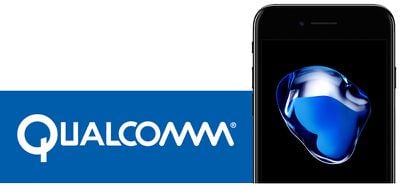Qualcomm today scored a major victory in its ongoing antitrust battle with the FTC, winning an appeal that will prevent the San Diego company from having to renegotiate its licensing agreements with smartphone makers.

Back in May 2019, the Federal Trade Commission won an antitrust lawsuit against Qualcomm, with the court ruling that Qualcomm's "no license, no chips" model that allowed Qualcomm to refuse to provide chips to companies without a patent license, violated federal antitrust laws. The ruling required Qualcomm to renegotiate all of its licensing terms with customers in good faith.
According to Bloomberg, the federal appeals court today said that the judge in the original case was wrong to side with the FTC, and the court vacated the order mandating that Qualcomm re-establish its licensing deals with companies like Apple.
The court said that the original ruling went "beyond the scope" of antitrust law and that Qualcomm's licensing practices are not anticompetitive because Qualcomm is "under no antitrust duty to license rival chip suppliers." If Qualcomm has breached obligations to license patents under fair and reasonable terms (FRAND), the issue needs to be brought up under patent law, not antitrust law.
In a statement, the FTC called the court's ruling "disappointing" and said that it will be considering options going forward. The FTC can appeal the decision, but if it stands, it will end Qualcomm's years-long legal battle over its chip licensing deals.
Qualcomm general counsel and executive vice president Don Rosenberg told Bloomberg that the ruling validates Qualcomm's business model.
"The court of appeals unanimous reversal, entirely vacating the district court decision, validates our business model and patent licensing program and underscores the tremendous contributions that Qualcomm has made to the industry."
Qualcomm's fight with the FTC ran concurrent with its legal battle with Apple. The Qualcomm vs. Apple dispute spanned years, but was resolved last year when the two companies reached a settlement and agreed to drop all litigation.
Apple had accused Qualcomm of unfair licensing deals and overcharging for the iPhone components that it supplied to Apple, but Apple dropped the case because it has no other source for 5G modems for its iPhones. Apple tried using Intel modem chips in its devices and did so successfully for a few years, but Intel ultimately could not produce the chips Apple needed and ended up selling its modem chip business.
Apple purchased Intel's smartphone modem business for $1 billion, and in the future, intends to manufacture its own modem chips. For now, though, Apple continues to be reliant on Qualcomm and this year's iPhone 12 models will be equipped with Qualcomm modem chips.























